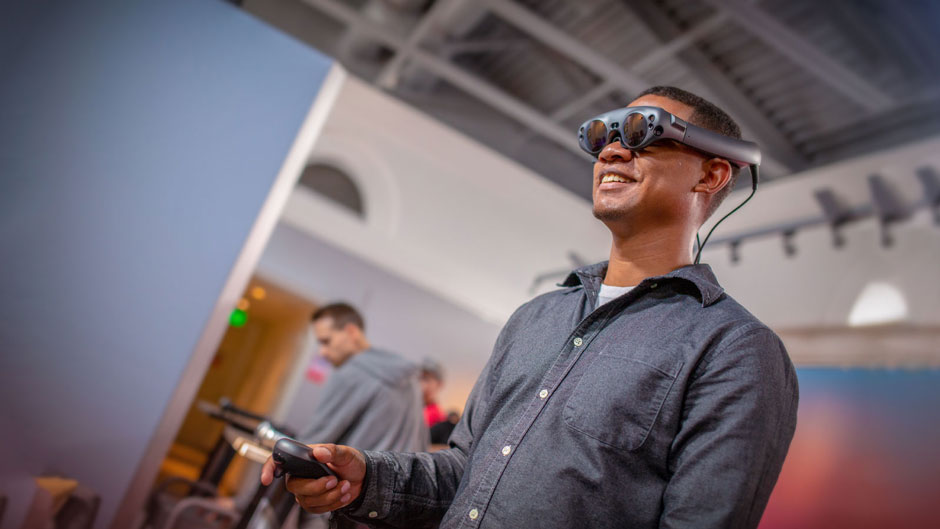There was a humpback whale inside the Wellness Center this week. Dozens of University of Miami students, faculty and staff braced for the splash of the whale breaching into the ocean. This was just one demonstration of what Magic Leap’s spatial computing technology can make possible. Throughout the week, the startup company hosted a variety of demonstrations that included a life-like Shakespeare performance and a trip inside a brain.
Rodrigo Silva, a graduate student in construction management at the School of Architecture, completed a Shakespeare demonstration where an actor is projected on a table and recites the famous “Seven Ages of Man” monologue from the play “As You Like It,” as a tree’s leaves change color and shed through the seasons behind the actor. 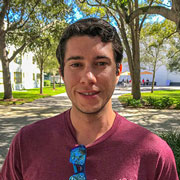 Silva said he could see using a similar program to show clients and contractors 3D plans for buildings.
Silva said he could see using a similar program to show clients and contractors 3D plans for buildings.
“It could replace model-making, which takes a lot of time right now, and sometimes it could cost upwards of $30,000, so [with Magic Leap’s technology] you can picture someone projecting the same 3D model … for a much cheaper cost,” said Silva, who also works part-time as an architect.
Mykal Hill, a first-year law student, also saw the Shakespeare demonstration and appreciated how 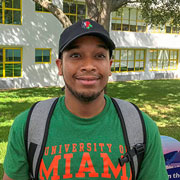 he could walk around the actor and see him performing. He also got to participate in “chat” where he could video chat with a person across campus. Hill said that the technology could have many applications to the legal field.
he could walk around the actor and see him performing. He also got to participate in “chat” where he could video chat with a person across campus. Hill said that the technology could have many applications to the legal field.
“Maybe when presenting evidence in court, if people are not able to see something in person, it could be projected, or even to recreate scenarios of things that may have happened, like a car accident or a personal injury case, like a fall this would be useful,” Hill said. “Also, in terms of sharing memos or briefs with other lawyers, the chat’s ability to foster collaboration would be cool.”
Rod Dunlap, a College of Engineering alumnus, tried the Dr. Grordbort's Invaders gaming 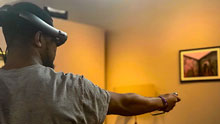 application and the Shape Up building design software.
application and the Shape Up building design software.
“[Shape Up] could help architects design the ideal buildings for their clients as they can easily edit the building prior to a final design,” he said. “Homeowners could have the option to download a file with the desired living area and mix and match furniture and appliances prior to the actual purchase. This could eliminate the need for an open house, saving time and money.”
Mendel Lebowitz, Sophomore Neuroscience major
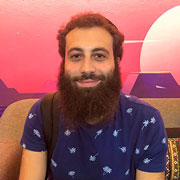 “I particularly enjoyed the Brain lab demo because I feel like it could be the future of surgery. I could definitely envision this impacting a variety of courses, like biology. Students in the future could actually visualize and tangibly experience the material that is being taught in the course. I’m excited to be part of this partnership. This could definitely further UM’s standing in the education world.”
“I particularly enjoyed the Brain lab demo because I feel like it could be the future of surgery. I could definitely envision this impacting a variety of courses, like biology. Students in the future could actually visualize and tangibly experience the material that is being taught in the course. I’m excited to be part of this partnership. This could definitely further UM’s standing in the education world.”
Iris Zhang, Sophomore Computer Engineering
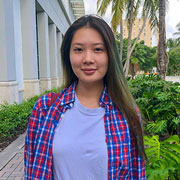 “There’s still a lot of work to be done, but overall the experience has been very impressive. We are experiencing the next generation of technology. I think it will be popular in the future, especially for online learning.”
“There’s still a lot of work to be done, but overall the experience has been very impressive. We are experiencing the next generation of technology. I think it will be popular in the future, especially for online learning.”
Zihao Fan, Sophomore Computer Engingeering
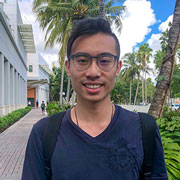 “Computer engineers like myself will be the ones who will shape and develop the software for new programs. If we gear this technology toward education, I think it will be very interesting to see how it will all play out. I’m already thinking of different ideas I can create here at UM.”
“Computer engineers like myself will be the ones who will shape and develop the software for new programs. If we gear this technology toward education, I think it will be very interesting to see how it will all play out. I’m already thinking of different ideas I can create here at UM.”
Andrea Ezell, third year law student
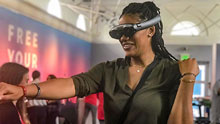 “Wow! I think there are so many future options! It could be used in training simulations for police and those in the medical field; therapy training to encourage movement and mobility; and in theatre so that actors can practice their lines in front of a simulated audience.”
“Wow! I think there are so many future options! It could be used in training simulations for police and those in the medical field; therapy training to encourage movement and mobility; and in theatre so that actors can practice their lines in front of a simulated audience.”
Jean-Claude Noel, father of UM alumna
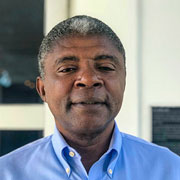 “I promised my daughter that I would come try it for her. She’s currently in graduate school at Harvard. As a banker, these kinds of technologies would really help me visualize business plans to my clients. I could use it to show lots of infographics and make it fun. I also think this will be really useful to start-ups.”
“I promised my daughter that I would come try it for her. She’s currently in graduate school at Harvard. As a banker, these kinds of technologies would really help me visualize business plans to my clients. I could use it to show lots of infographics and make it fun. I also think this will be really useful to start-ups.”
